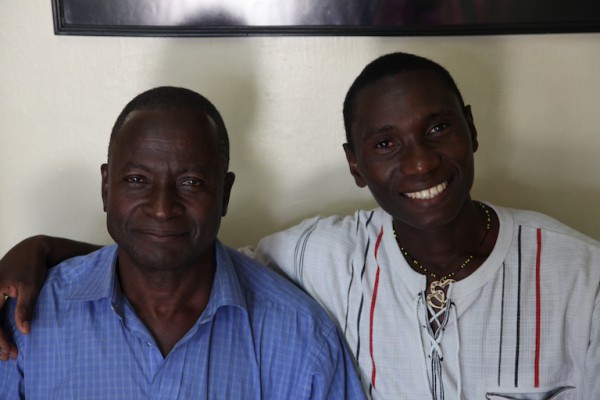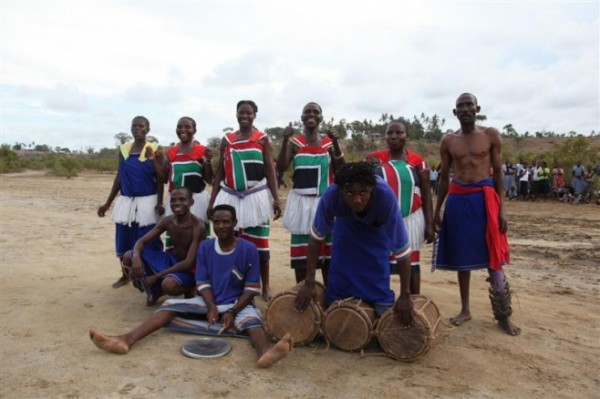On our last night in Nairobi following the recording trip to Northern Uganda we met with Swalhe Mwatela Massai, the founder of Msergo Mwatela Group, from the Coastal regions of Kenya. He originally performed with his father’s group and then he founded this group in 2007. They use a number of styles, most notably Sengenya, which we covered fully in our March 2011 field recordings in Malindi.
We interviewed Swalhe Mwatela Massai and his grandson, Ali Tungwa :
Q to the grandfather: In contrast to Uganda, we have seen many villages in Kenya where the traditional music is only played by the older generation. And yet your group is so young and vibrant. How have you managed to do this?
A: To get the young people involved I decided to go to schools and teach music. I compose new material with my students and come up with something they like. I watch how they dance and whether they feel the rhythms and I try to teach them what I’m doing, but I also adapt to how they feel the music. I let them take the music where they want to take it as long as it is rooted in our traditions. I just watch them dance and move and create the linkages.
Q to the grandson: Why are you doing this? Are you viewed as cool by your friends, or somewhat ‘out of touch’?
A: Maybe it’s the friends I pick, but I’m viewed as a role model by my friends. I play the percussion and cymbols for the band and dance and it is viewed as very cool. I can’t help but be involved. My parents were students of my grandfather and I grew up with this music. It is in my blood and I feel a duty to protect my culture, to give back to it, to make it strong for my children. This music is critical to our village near Malindi, Thalatha Meli. I started learning it from my grandfather formally when I started at Takaye Primary School. In the group, my role is percussionist and I play the four drums of the Sengenya. I also dance and wear the shakers . And also I play the Chapuo, this is the small drum and the Upatsu (cymbol). I don’t feel ashamed to play this music. I don’t feel ashamed that I have an amazing teacher, my grandfather. He’s taught everyone, including Kaboge Chagalla (a famous Nairobi percussionist) and Mwatela Kamanza (pictured in the far right of the group, Sengenya, we recorded in March 2011 near Mombassa ).
We recorded three songs with the band at Ketebul studios tonight. These are:
- Ndege Ya Panda Mlima (Sengenya Style) : Written in 1988, this literally means ‘Music’ Strengt’h (Ndege) can climb up (Ya Panda) mountains (Mlima) and is about the power of music to heal and transform.
- Howenaya (Ngarawa Style) : This is about ‘asking back’ – the singer is promising the power of his music to the audience and wondering what he will now get in return.
- Namlaga Sichimbira (Cheche Style ): This song warns the audience that the singer is taking his songs on the road. They shouldn’t be jealous or worried – he remains part of the village, but others need to hear his music.
It is now almost midnight and we’ve recorded some fantastic music. The hotel restaurants are closed again, so we will be taking this group out for some food and then open up the studio tomorrow for the last day of this trip. We have asked the leader and his grandson back tomorrow for more discussions given they represent exactly what Singing Wells is trying to achieve. Until tomorrow then…
Jimmy
(Ketebul Studios)


